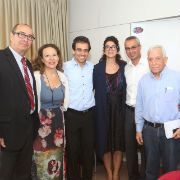Why Don’t You Like Me Anymore?
Facebook and other social media sites are becoming increasingly important for political exposure and debate. This is especially true in times of conflict, when highly politicized individuals and groups turn to social media sites to express their views – including by “unfriending” and “unfollowing” people who don’t agree with them.
In a study published in the Journal of Communication, Dr. Shira Dvir-Gvirsman of TAU’s newly dedicated Dan Department of Communication, and her collaborator, Dr. Nicholas A. John of the Hebrew University of Jerusalem, examined the phenomenon of “political unfriending” on Facebook and found that it reflects a new form of political disengagement. The researchers surveyed 1,103 Jewish Israeli Facebook users from between 1 to 10 days after the Israeli-Gaza conflict of 2014 and found that nearly a fifth (16%) of users had unfriended someone based on political comments, while a further 19% considered doing so before ultimately deciding not to.
Facebook is by far the most popular social network site in Israel, with around 3.9 million registered users out of a population of 8 million, notes Dvir-Gvirsman. Twitter, by comparison, has less than 200,000 users in Israel. During the 50 days of Gaza conflict, “How to block people on Facebook?” was the tenth most common search on Google Israel, she adds.
The researchers found that 73% of respondents reported unfriending Facebook contacts whose views differed from their own, but these contacts represented “weak ties” rather than friends they engage with on a regular basis. People have an average of 338 friends on Facebook, more than they can maintain offline.
“The people who are most likely to unfriend others are younger, more politically engaged, and more active on Facebook; have lots of Facebook friends; and have more extreme political views,” say the researchers. Among their responses is a tendency to associate and bond with others who hold similar views. “The act of disconnecting can be seen as aimed at creating a ‘clean’ environment where there are no or fewer voices that you would rather not hear,” says Dvir-Gvirsman. “This can create barriers to critical discourse.”
The study shows that although social network sites are commonly considered a source of connectivity and sharing, they are alarmingly becoming a source of disconnectness and polarization of ideas. “If it is commonly argued that greater civic engagement is good for democracy, the findings imply a worrying link between having strong political views, voicing those views and silencing opposing positions, says Dvir-Gvirsman.
The researchers also raise the question of how Facebook’s algorithms might be “filtering” out unwanted political posts from personal newsfeeds. “We all know that Facebook influences behavior. It gives you what it thinks you want to see, or in this case, what you don’t want to see. This leads to a perturbing form of social media censorship,” she says.
The study is the first to examine Facebook unfriending in a conflict setting outside of the United States.






